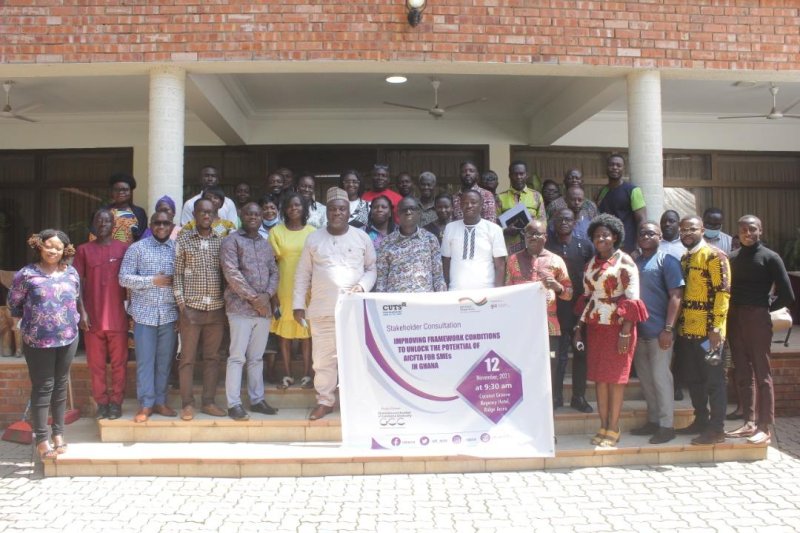Accra, Nov. 15, GNA – Mr Isaac Yaw Obeng, a Research Associate, has called on government and policy analysts to sensitize Small Medium Enterprises (SMEs) on the benefits of the Africa Continental Free Trade Area (AfCFTA)
AfCFTA aims at accelerating intra-African trade and boosting Africa’s trading position in the global market by strengthening Africa’s common voice and policy space in global trade negotiations.
Accra, Nov. 15, GNA – Mr Isaac Yaw Obeng, a Research Associate, has called on government and policy analysts to sensitize Small Medium Enterprises (SMEs) on the benefits of the Africa Continental Free Trade Area (AfCFTA)
AfCFTA aims at accelerating intra-African trade and boosting Africa’s trading position in the global market by strengthening Africa’s common voice and policy space in global trade negotiations.
As at 5 February 2021, 36 countries had deposited their instruments of ratification. Thirty-six countries have ratified the agreement.
It is to create a single market for goods, services, facilitated by movement of persons to deepen the economic integration of the African continent and in accordance with the Pan African Vision of “An integrated, prosperous and peaceful Africa” enshrined in Agenda 2063.
It is also to create a liberalised market for goods and services through successive rounds of negotiations.
Mr Obeng presenting findings of a study on operations of SMEs at a stakeholder consultative meeting by CUTS International, Accra, a research and public policy think-tank, said government should ensure that all barriers such as delays at the ports, airports and general bureaucracies were eliminated or drastically reduced.
The study assessed the level of competitiveness and growth-readiness of Ghanaian SMEs for enhanced participation in the Africa Continental Free Trade Area (AfCFTA).
The consultative meeting was on the topic: “Improving framework conditions to unlock the potential of AfCFTA for SMEs in Ghana,” and expected to come out with a diagnostic report to help develop practical steps in addressing gaps and challenges towards improving the business framework conditions for SMEs.
The study, which is still at the consultation level, seeks to identify how uncompetitive framework conditions could affect the competitiveness of SMEs under AfCFTA.
He said government through the Export-Import bank should assist viable SMEs with the needed financial support to boost their export trade.
“Government should ensure that there is stability in the general price level. This probably may be the first step to the SMEs maintaining or reducing their prices,” the Researcher said.
Mr Obeng called on government to provide the needed trade infrastructure for SMEs to be competitive and ensure a general macroeconomic stability in relation to exchange rate, inflation and interest rate.
He entreated SMEs to familiarize themselves and their general workforce on the essence of AfCFTA, and how beneficial it could be to their businesses, and that they should acquire both domestic and internationally recognized quality certification.
The Researcher said SMEs must make conscious effort to engage or trade in the African export market.
He called on Ghanaian SMEs interested in AfCFTA to sharpen their export marketing skills or expertise and enlarge their managerial and financial capacity for the export business.
“SMEs should make it a deliberate policy to introduce new technology to improve their production process, while having a deliberate policy to introduce a new or a significantly improved products into the market regularly in order to keep up with competition,” he added.
He said SMEs needed to be more competitive in terms of the pricing of their products and product quality. They should diversify or add value to their products, ensuring that their products were differentiated.
Over 80 per cent of Ghanaian Small Medium Enterprises (SMEs) do not have any form of international certification to enhance their business operations globally.
Also, only 22 per cent of SMEs have a quality certification from a relevant domestic regulatory authority while the remaining 78 per cent have none.
Thirty-nine per cent of the SMEs surveyed said they used emails to communicate with their customers and suppliers, while only 29 per cent owned and used a website to enhance their daily operations.
“63 per cent of the SMEs indicated that they use some form of technology like mobile phone with social media platforms to enhance their productivity,” he added.
Mr Obeng, said the study showed that 42 per cent of the SMEs prepared annually audited financial accounts while 58 per cent did not.
Consequently, he said only 20 per cent of the SMEs indicated that they had good or excellent capabilities to engage financial institutions for support.
GNA


